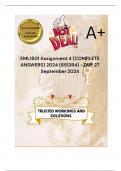, .
Question [40] 1.1 Learning to read and write are both social and
cognitive endeavours. Children learn from parents, siblings,
teachers and their peers. They copy what they see from these
knowledgeable others and also make their own sense of the
written words. Allow children to scribble around and read their
scribbles to you. Based on the above excerpt, answer the
following questions: 1.1a. Justify why reading is regarded as
essential for children’s social and cognitive development. (10)
1.1b. Demonstrate your understanding of why reading and
writing are regarded as inseparable components of literacy
development. (10) 1.3 Differentiate between shared reading and
independent reading. (10) 1.4 Describe effective ways that a
foundation phase teacher should follow during reading aloud
strategy. (10)
1.1a. Justify why reading is regarded as essential for
children’s social and cognitive development. (10 marks)
Reading plays a crucial role in both the social and cognitive
development of children for the following reasons:
1. Language Acquisition: Reading exposes children to a
wide variety of vocabulary and sentence structures, which
enhances their language development. This, in turn,
improves their ability to communicate effectively with
others, facilitating better social interactions.
, 2. Cognitive Development: Reading stimulates the brain,
encouraging the development of critical cognitive functions
such as memory, attention, and problem-solving skills. It
engages children's minds and encourages them to think
analytically and creatively.
3. Social Interaction: Through stories and texts, children
learn about different social roles, norms, and experiences,
helping them to understand and empathize with others. This
promotes emotional intelligence and enhances their ability
to interact positively in various social settings.
4. Imitation and Learning from Others: As the excerpt
suggests, children learn by copying the actions of
"knowledgeable others" like parents, siblings, and teachers.
Reading together or modeling reading habits encourages
children to adopt these behaviors, which strengthens both
their social and cognitive development.
5. Cultural Awareness: Reading exposes children to diverse
cultures, traditions, and perspectives. This helps them
understand and appreciate diversity, making them more
socially aware and open-minded.
6. Self-expression: As children develop reading skills, they
are better able to express themselves through language,
which enhances both their social relationships and
cognitive abilities, such as the ability to organize thoughts
and ideas.
7. Socialization through Shared Experiences: Reading with
others, such as in group activities or storytelling, helps
children build social bonds, share ideas, and develop
collaboration skills.




